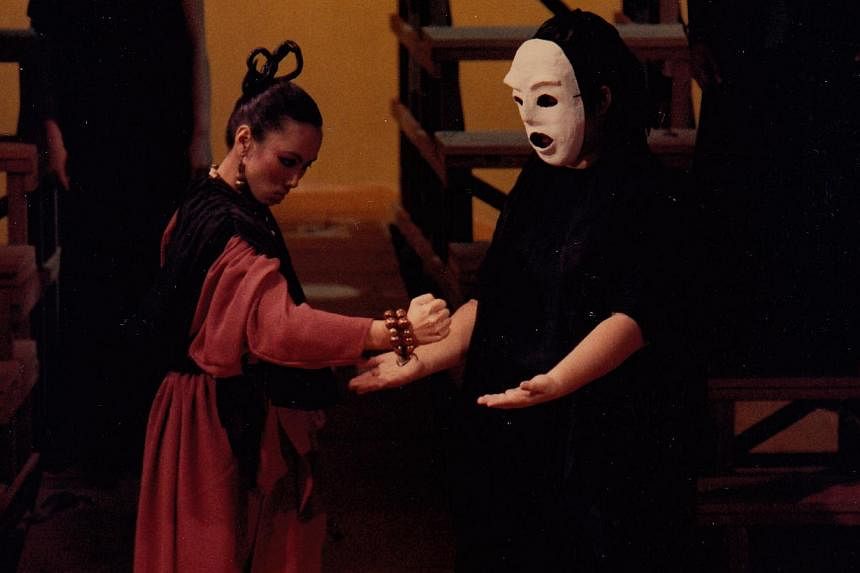It is storming outside; sheets of torrential monsoon rain streak the windowpanes. But in her warm, earth-toned living room, Claire Wong is bringing a spot of colour to an otherwise gloomy day.
"I'm so sorry about the rain," she says, wide-eyed and genuinely apologetic, even though she can hardly be faulted for the bad weather.
It is this compulsion to put others ahead of herself that permeates this interview with the actress and director, 50, the joint artistic director of Checkpoint Theatre, which she runs with her husband, playwright Huzir Sulaiman.
Their quiet, breezy condominium in the west is an oasis of art and literature. A hefty bookcase, with spines sorted by colour, takes up one wall. Numerous paintings adorn the others. The couple's Malaysian roots (they are Singapore permanent residents) quickly come to light as Wong proudly points out several works by Malaysian artists, including Wong Hoy Cheong and Yee I-Lann.
Charismatic and confident on stage, Wong has slipped into the shoes of many a leading lady, from Mao Zedong's steely and ambitious wife Jiang Qing (Madame Mao's Memories, 1991) to the wracked Desdemona (2000) in Ong Keng Sen's provocative and polarising production.
She has been nominated for Best Actress at the Life! Theatre Awards twice, for playing more than a dozen characters in Huzir's Atomic Jaya (2003), a rollicking satire imagining what might happen if Malaysia decided to build an atomic bomb, and Occupation (2002), a tender ode to Huzir's grandmother, pioneering feminist Mrs Mohamed Siraj.
But she is also a leading lady behind the scenes, as a director who has put together numerous well-received plays, many of them her husband's. In 2004, she received another nomination for helming playwright Eleanor Wong's Invitation To Treat trilogy, one of lesbian relationships and legal entanglements. She is currently directing The Way We Go, a meditative work about love and friendships by Joel Tan, which runs till Saturday.
Wong takes quiet pride in her directorial craft, where she is more than happy to let others take centre stage. It is her invisibility cloak, so to speak: "The point is to make it seem effortless. There are a lot of nuances and subtleties that we have to work so hard at, with a lot of craft, to make them unseen. Because the point of it is the world you're creating: the characters and their story."
Wong's own story is one of a consistent pursuit of excellence.
Born in Penang to a police officer father and housewife mother, Wong grew up in Kuala Lumpur. Her father had been assigned to work at the police headquarters there and the family moved with him. Wong, the youngest of five children, led a happy childhood with her three older sisters and one older brother.
She stood out in school as head girl and sports captain and was frequently top of her class - factual tidbits helpfully supplied by her husband.
"These are things she'll never tell you," Huzir, 40, says with a grin.
Her family was not well-to-do. "My father was an honest cop," she says with a laugh, "therefore we were not at all rich."
But they lived frugally and got by. Her well-read father was set on giving them a good education. (During the Japanese Occupation, his father hid in a chicken coop, with only the complete works of Shakespeare for company.)
After graduating from high school, where she had represented Selangor state in badminton competitions and was president of the literary, drama and debate society, Wong was sent across the Causeway to study at National Junior College. She lived with her relatives in Singapore.
Now she finds herself firmly attached to both Singapore and Malaysia.
"People always ask me, are you Malaysian or Singaporean? And I always say, one's my mother and one's my father, and that's the honest truth," she says. "They both have an important part in my life, in the same way you have different relationships with your parents, but they are both equally important."
In junior college, despite taking predominantly science subjects, she fed her interest in drama by taking part in school plays. Quickly realising that the sciences were not for her, she decided to go for a law degree at the National University of Singapore, with an illustrious batch of classmates that included directors Ong Keng Sen and Ivan Heng, artist-curator Matthew Ngui, and Members of Parliament Sylvia Lim and Lim Biow Chuan.
She loved both law and theatre: "I thrive on having both sides of the brain stimulated. There were a lot of similarities - it's really about language, about analysis, about storytelling as well."
Before she was called to the bar, Ong invited her to take one of the leading roles in a musical that would change the landscape of Singapore theatre, and arguably her own life - Michael Chiang and Dick Lee's Beauty World (1988). For her professional debut, Wong played the sweet and simple Ivy, a small-town girl from Malaysia who comes to Singapore in search of her family history. It was a roaring success, a musical that struck the right notes between nostalgia and a burgeoning Singapore identity.
"You really felt that you were making something of the times that was very specific and really finding your own language," she says, "not just the English language, but also drawing from our Asian roots, and claiming it as who we were, as contemporary theatre performers."
The late 1980s was a fertile period in Singapore theatre. Her friendship with Ong proved to be creatively fruitful - she was one of his favoured leading ladies during those years. In addition to Madame Mao's Memories and Desdemona, he also directed her in Malaysian playwright Leow Puay Tin's Three Children, a surrealistic play that follows three siblings as they remember their childhood in Malacca. Ong said in an earlier interview that "Claire pushes herself to the limit", describing the actress as "amazing" and possessing "a certain radiance" on stage.
Like most practitioners then, Wong would race from the office, where she was doing litigation at law firm Allen & Gledhill, straight to the rehearsal room, plunging into plays in the evenings and on weekends.
While her bosses at work were "always very supportive" ("They always knew I came with a theatre bag," she says with a chuckle), it was not always easy to juggle both her passions.
As Allen & Gledhill began to expand in the region, trips to Myanmar took her away from the theatre for months at a time. She later became a partner at law firm Helen Yeo & Partners.
Eventually, she felt the urge to "get off the corporate ladder" and to live abroad, and to receive more formal theatre training. She applied to Columbia University's prestigious master's of fine arts in theatre arts and was soon on a plane to New York.
While immersing herself in the western theatre canon, she began to hone her instincts as a director and she also loved the rigour of physical theatre training and the opportunity to learn from like- minded practitioners.
After graduating from Columbia, the prospect of a glittery career in New York beckoned. But Wong felt the tug of home.
And it was fortuitous that she did return, because she would meet her future husband that same year, through the first role she was offered.
Huzir had just penned his hit play Atomic Jaya. It was to be staged at The Substation as part of a selection of Malaysian plays, with the late Malaysian director and theatre luminary Krishen Jit at the reins. Jit cast Wong in the show.
She recalls: "I was very impressed by the writing and, of course, the humour and the sharp observations. I remember Huzir coming to the rehearsal room and sitting in a corner, watching, very serious-looking." Jit encouraged the playwright and the actress to get to know each other better - and they ended up falling in love.
Huzir speaks about Wong with great warmth. Throughout the interview, he gazes affectionately at his wife of 10 years, unobtrusively filling up her glass of water whenever it runs empty.
He says: "She's very kind and has an enormous sense of compassion, but is also, in the best possible way, demanding. As a partner, a spouse, a colleague, a family member - she makes you want to be the best that you can be."
Singapore's theatre scene is dominated by power couples, including Tracie and Adrian Pang of Pangdemonium, Nelson Chia and Mia Chee of Nine Years Theatre, and Ivan Heng and Tony Trickett of Wild Rice. Huzir and Wong, who also run the creative consultancy Studio Wong Huzir, share that professional chemistry.
Wong says: "We are each other's harshest critic and biggest supporter. And you need that. You need somebody to tell you when something is not quite going right and somebody whose opinion you trust, who is able to tell you exactly what it is. That's so important. And at the same time, for somebody to tell you, during the difficult times, that you're doing the right thing, it's fantastic, it's correct, it's powerful - stay on track."
It was this meshing of creative minds that led to the creation of Checkpoint Theatre in 2002. This was a period in Singapore theatre that was marked by abstract, experimental work, and while Wong and Huzir loved that, they felt "a desire to go back to the craft of writing".
There is a cultural fluidity to Checkpoint that spans both Singapore and Malaysia, and the company, while based here, also works comfortably on the other side of the Causeway. The couple have no children, but their company is known for its focus on developing a practitioner's craft, especially among younger artists.
Wong will soon enter a new chapter of her life - she is leaving law firm Rodyk & Davidson at the end of the month, where she was head of training. She will be able to spend more time with her elderly parents, who are in their 80s, and to also pour more of herself into theatre.
She has several projects planned for next year, including a new work about education in the oft-overlooked Normal stream by Faith Ng. The playwright and educator, 27, whose plays wo(men) (2008) and For Better Or For Worse (2013) have mined ordinary Singaporean life for the extraordinary, describes Wong as "rare and brilliant", a necessary part of her growth as a writer.
She adds: "Despite her successes and her experience, she doesn't put on airs. She treats each and every person like an equal. The confidence and trust she has in me have made me believe in myself as a playwright. I'm no longer afraid to ask questions, to give suggestions or to take creative chances."
Wong notes that a lot of improvisational work during the rehearsal process is eventually not seen on stage, "but it really feeds the actor's imagination". Playwrights and actors alike have lauded her directorial instinct.
Seasoned actress Jean Ng, 44, gushes about her experience working with Wong, describing her as incredibly "meticulous and detailed", a director who is "demanding yet so kind and caring".
For instance, Ng addressed many "invisible" characters on stage in For Better Or For Worse: "Once, Claire said to me that my character's daughter, one of the invisible characters, should be 5cm taller than what my eye was indicating. Her eyes are so sharp you can't get away with anything, not a twitch of the finger or a tap of the foot."
She emphasises: "I always say, one becomes a better actor by working with Claire Wong."
Wong ponders what an ideal director would do: "The best directors are those who give enough vision and have clarity of direction, but also have an ability to draw out the creative best from the team."
Judging from the praises of others, she could very well be describing herself.






